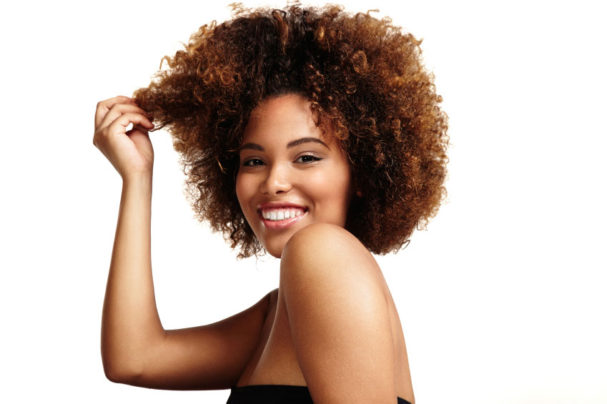Fusion Hair Salon’s Abdul Benza and Patrick Muke gave us the lowdown on everything you’ll need to know about caring for your Afro hair.

Pictures: iStock.
Does the weather affect how your grow your Afro? Why?
The weather and its seasonal changes can affect how you grow your Afro hair as it impacts upon the texture and the necessary steps to maintain moisture within the hair.
The winter for instance, would cause the hair to become dry and therefore brittle which would cause breakage at the ends.
Is it recommended to use treatments for your Afro?
It is strongly recommended that treatments are used for your hair to simply repair and protect the hair cuticle from external factors and breakage.
What are a few important tips you can give to a woman wanting to grow her Afro?
It is very important that oil and moisturisers are used on the scalp between 3-4 times a week, applied before sleep over night to prevent the scalp from drying out.
Afro-textured hair, furthermore, does not benefit from daily washing. When hair is washed every day it is stripped of its natural essential oils, which leads to dryness and weathering of the hair fiber.
People with Afro-textured hair already have naturally dry hair so washing the hair frequently only increases this dryness and leads to damage.
The use of a good moisturising shampoo and conditioner is imperative to relieve dryness.
Why is it important to use moisturisers on ethnic hair?
Afro-textured hair requires a different type of hair care as it is susceptible to becoming dry faster than that of Caucasian hair.
Are there different moisturisers for braids, relaxed hair and natural hair?
When Afro-textured hair is washed and not styled, it naturally forms into the coiffe that is known as the Afro. The moisturisers are the same for braids, relaxed hair and natural hair.
Is dryness the main concern?
The number one gripe many have about their Afro hair is dryness. Whether relaxed or natural, curly or straight, this chief concern has plagued kinky and curly textures for ages; hydration is key to the conditioning process.
Should you use a comb when applying conditioner?
Styling tools such as combs and brushes, for example, force the curls to elongate, but the curls naturally resist, resulting in breakage. Delicate care is thus needed to preserve hair growth and avoid hair damage. Even when applying a conditioner a comb should be avoided.

Did you know?
There are five classifications of Afro-textured hair, all of which are variations of curly hair.
These classifications range from a looser curl texture to a tightly curly or coily texture.
While the biochemical composition of Afro-textured hair is identical to that of Caucasians and Asians, it is its morphological difference in elasticity and comb-ability that causes Afro-textured hair to have different needs. This curly disposition leaves the hair more susceptible to breakage.
The curliness of Afro-textured hair also causes it to have less moisture content than other ethnic groups. Every ethnic group’s scalp naturally produces a lubricant called sebum, which is an oily substance that moisturises and protects the hair follicle.
Water is the second source of moisture that all ethnic groups need to moisturize their hair. Both sebum and water travel down the hair shaft to lubricate the hair, but when these two elements are not able to travel all the way down the hair shaft or absorb into the hair strand, it leads to dry hair.
The shape of curly hair, especially tightly curly hair, does not create a straight path for sebum and water to travel all the way down the hair shaft — this is why Afro-textured hair loses moisture quickly after washing.
Dry hair, or hair without moisture, reduces hair pliability and makes it even more difficult to manipulate the hair without breakage, which is one of the reasons that moisture retention is very important for healthy Afro-textured hair.

